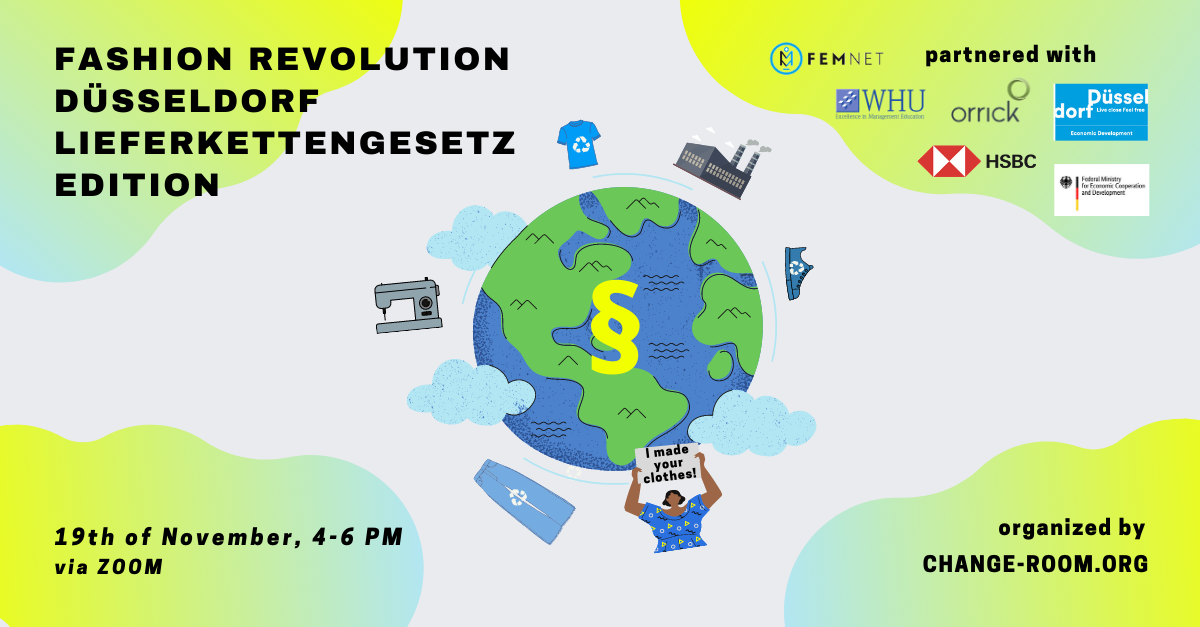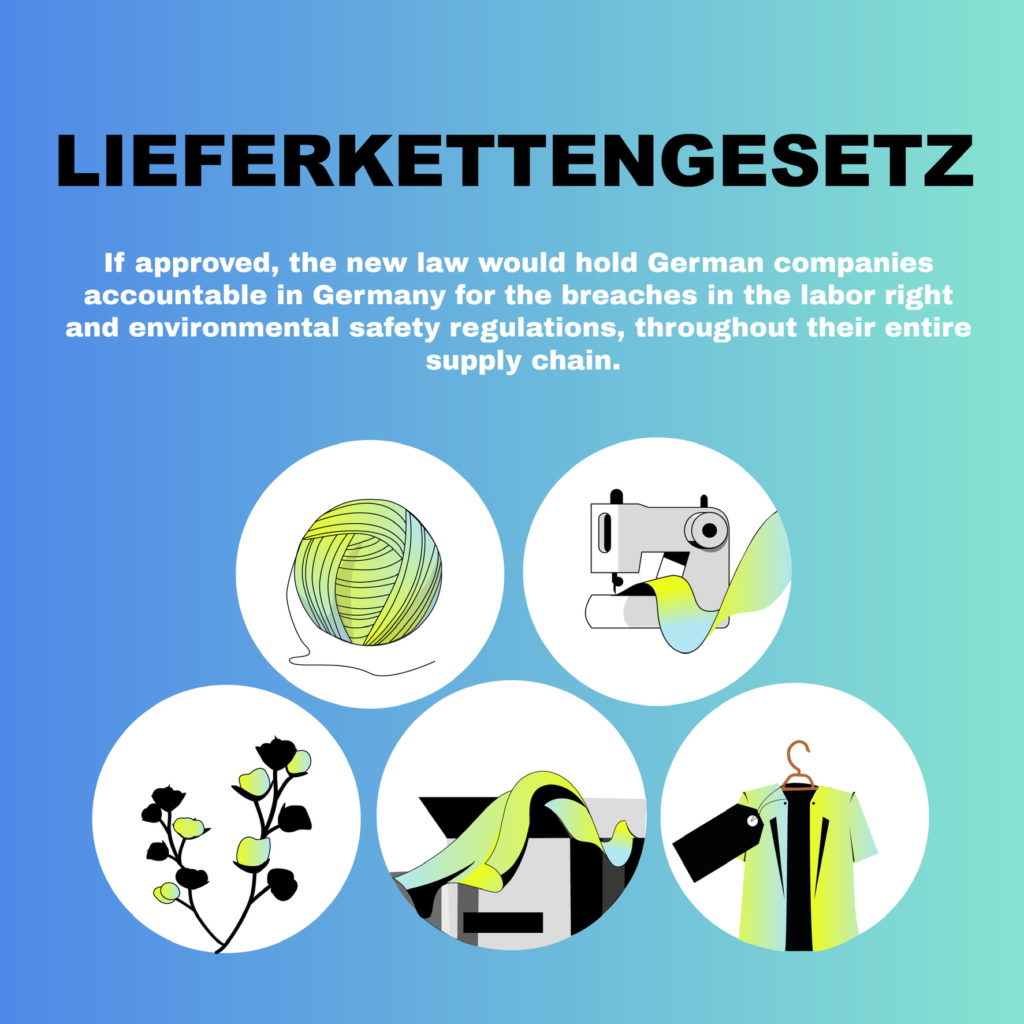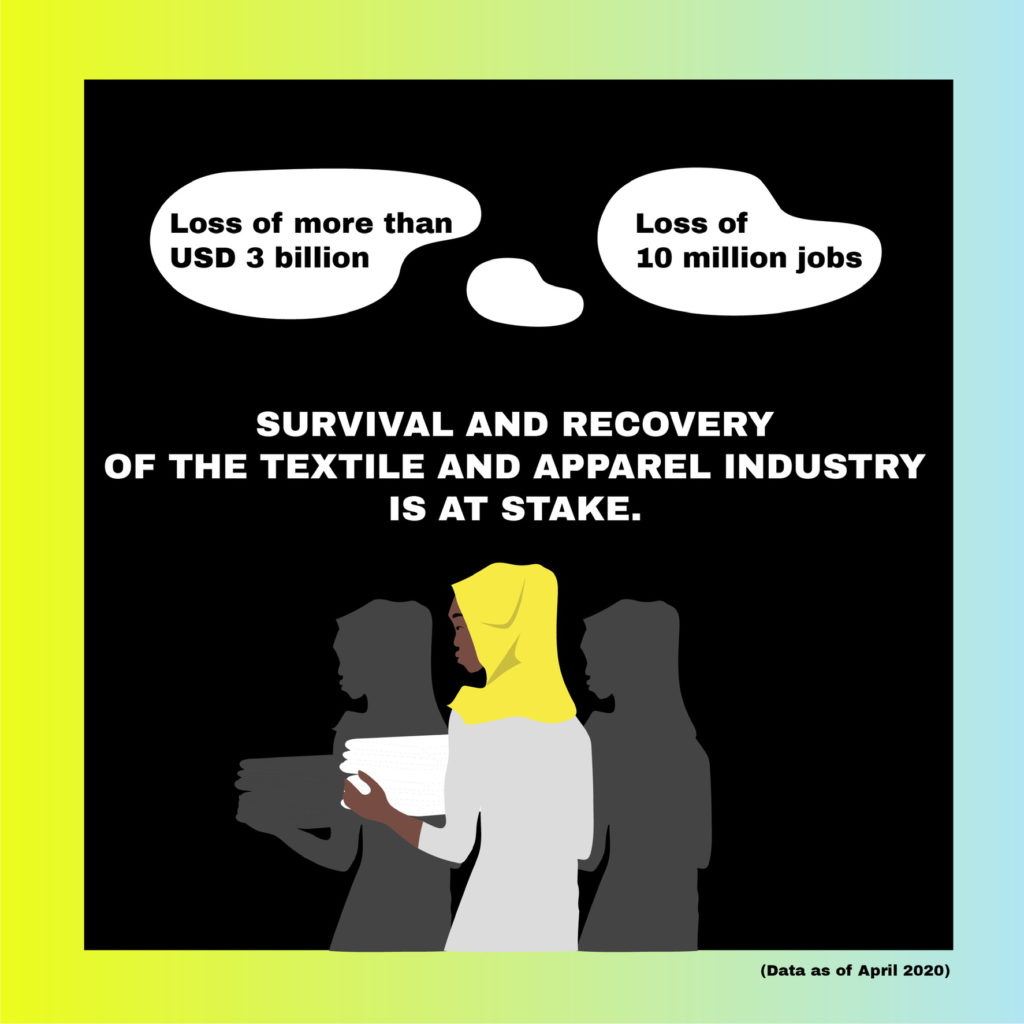The Lieferkettengesetz Edition

DATE
PARTNERS
FEMNET; Wirtschaftsförderung Düsseldorf; Orrick, Herrington & Sutcliffe; HSBC Germany;WHU - Otto Beisheim School of Management
VENUE
ONLINE
LANGUAGE
ENGLISH
The global pandemic has hit the fashion industry particularly hard. But, it is the most vulnerable who have been hit the hardest – the sewers, the artisans and the farmers in the developing world countries – those that live with constant food shortage and little access to unemployment insurance.
Eager to reduce losses, many large multinational brands canceled their orders placed and produced before the pandemic. A report, “UNPAID BILLIONS,” by the Worker Rights Consortium and the Penn State Center for Global Workers’ Rights, draws on trade data and reveals that at least $16.2 billion went missing from the fashion supply chains.
A further study by the European Center for Constitutional and Human Rights, and the Solidarity Center’s International Lawyers Assisting Workers Network showed that fashion industry’s unpaid bills have had disastrous consequences on the lives of the garment workers and resulted in massive layoffs – at least one million workers in Bangladesh, 150,000 in Cambodia.
But, the foundation for this crisis was laid long before the pandemic because international corporations are not held accountable for the human rights and environmental abuses that happen in their supply chains. With all the great work that numerous labour unions, NGOs and the FASHION REVOLUTION social movement have been doing, the global fashion industry seems unlikely to overcome its sustainability challenge via self-regulation and citizen-policing alone.
The German Chancellor Dr. Angela Merkel has spoken out in favour of an establishment of a Supply Chain Law. The so-called “Lieferkettengesetz” is about to be defined and put in action by the end of the year 2020. The new law will hold German companies accountable in Germany for the breaches in the labour right and environmental safety regulations, throughout their entire supply chain.
Directly affected will be large German companies with more than 500 employees, which have a balance sheet total of more than 20 million Euros and annual sales of more than 40 million Euros. The Lieferkettengesetz thus covers more than 6000 companies in Germany. Indirectly, however, it affects far more. Because large companies, which now have to prove that no violations occur along with their supply chain, will demand the same from their suppliers and possibly even make this a prerequisite for cooperation.
While the law has gained many supporters, it also spurred many debates about its consequences on the German economy and its international competitiveness.What does the Liferkettengesetz actually mean for the fashion industry? Whom will it affect directly and indirectly? These and many other questions were addressed in the second edition of our Fashion Revolution Düsseldorf Online event. To recap the best moments and the key messages, check out our event video!
The event started with a talk by Rekha Chakravarthi, Policy Advisor, Corporate Accountability at CIVIDEP India, who provided first-hand insights on how the global pandemic is influencing the garment factories and their workers in India. Dr. Gisela Burckhardt, CEO and Chairwoman of the Board at FEMNET, reflected on the actions taken by the German textile companies and gave an update on the recent developments in the making of the Lieferkettengesetz.
The event continued with an interactive discussion “Lieferkettengesetz – a legislative burden or a necessity?”, which was joined by the former German Federal Minister for Consumer Protection, Food and Agriculture and the Green Party representative Renate Künast. The corporate opinion on the Supply Chain Law was expressed by Julia Thimm, Head of Human Rights at Tchibo GmbH. The voice of startups and the world of tech was represented by Lukas Pünder, the Co-Founder of Retraced, a Düsseldorf based blockchain technology startup.
The event ended with a Digital Meet & Greet session where event participants had a chance to mingle with the event speakers and representatives of our partner organizations in smaller Zoom meeting room sessions. We say a big THANK YOU to our growing community of sustainable fashion professionals, innovators and change makers for their participation and their great spirit!

Event Illustration: Ugne Astravaite


#changeroom #changemakers #changefashion
MORE EVENTS
THE LIEFEKERTTENGESETZ EDITION

Orrick, Herrington & Sutcliffe;
HSBC Germany;
WHU - Otto Beisheim School of Management
The global pandemic has hit the fashion industry particularly hard. But, it is the most vulnerable who have been hit the hardest – the sewers, the artisans and the farmers in the developing world countries – those that live with constant food shortage and little access to unemployment insurance.
Eager to reduce losses, many large multinational brands canceled their orders placed and produced before the pandemic. A report, “UNPAID BILLIONS,” by the Worker Rights Consortium and the Penn State Center for Global Workers’ Rights, draws on trade data and reveals that at least $16.2 billion went missing from the fashion supply chains.
A further study by the European Center for Constitutional and Human Rights, and the Solidarity Center’s International Lawyers Assisting Workers Network showed that fashion industry’s unpaid bills have had disastrous consequences on the lives of the garment workers and resulted in massive layoffs – at least one million workers in Bangladesh, 150,000 in Cambodia.
But, the foundation for this crisis was laid long before the pandemic because international corporations are not held accountable for the human rights and environmental abuses that happen in their supply chains. With all the great work that numerous labour unions, NGOs and the FASHION REVOLUTION social movement have been doing, the global fashion industry seems unlikely to overcome its sustainability challenge via self-regulation and citizen-policing alone.
The German Chancellor Dr. Angela Merkel has spoken out in favour of an establishment of a Supply Chain Law. The so-called “Lieferkettengesetz” is about to be defined and put in action by the end of the year 2020. The new law will hold German companies accountable in Germany for the breaches in the labour right and environmental safety regulations, throughout their entire supply chain.
Directly affected will be large German companies with more than 500 employees, which have a balance sheet total of more than 20 million Euros and annual sales of more than 40 million Euros. The Lieferkettengesetz thus covers more than 6000 companies in Germany. Indirectly, however, it affects far more. Because large companies, which now have to prove that no violations occur along with their supply chain, will demand the same from their suppliers and possibly even make this a prerequisite for cooperation.
While the law has gained many supporters, it also spurred many debates about its consequences on the German economy and its international competitiveness.What does the Liferkettengesetz actually mean for the fashion industry? Whom will it affect directly and indirectly? These and many other questions were addressed in the second edition of our Fashion Revolution Düsseldorf Online event. To recap the best moments and the key messages, check out our event video!
The event started with a talk by Rekha Chakravarthi, Policy Advisor, Corporate Accountability at CIVIDEP India, who provided first-hand insights on how the global pandemic is influencing the garment factories and their workers in India. Dr. Gisela Burckhardt, CEO and Chairwoman of the Board at FEMNET, reflected on the actions taken by the German textile companies and gave an update on the recent developments in the making of the Lieferkettengesetz.
The event continued with an interactive discussion “Lieferkettengesetz – a legislative burden or a necessity?”, which was joined by the former German Federal Minister for Consumer Protection, Food and Agriculture and the Green Party representative Renate Künast. The corporate opinion on the Supply Chain Law was expressed by Julia Thimm, Head of Human Rights at Tchibo GmbH. The voice of startups and the world of tech was represented by Lukas Pünder, the Co-Founder of Retraced, a Düsseldorf based blockchain technology startup.
The event ended with a Digital Meet & Greet session where event participants had a chance to mingle with the event speakers and representatives of our partner organizations in smaller Zoom meeting room sessions. We say a big THANK YOU to our growing community of sustainable fashion professionals, innovators and change makers for their participation and their great spirit!



Event Illustration: Ugne Astravaite
#changeroom #changemakers #changefashion

